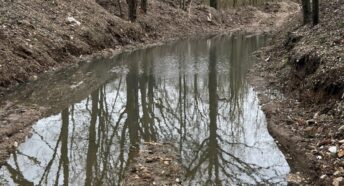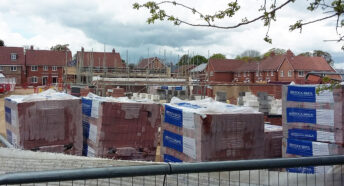'Diabolical': Jenrick backs huge housing scheme that sparked 'Cash for favours' headline

The leader of Swale Borough Council has slammed as “diabolical” the decision by Robert Jenrick, Secretary of State for Housing, Communities and Local Government, to back a 675-unit housing scheme at Borden, near Sittingbourne.
It was announced yesterday (Thursday, April 29) that Mr Jenrick was backing an appeal inspector’s decision to give Quinn Estates outline planning permission to build up to 595 homes, a primary school, shop, rugby clubhouse, three sports pitches and a road joining Borden Lane with the A249. There was also full permission for 80 homes.
To worsen matters for the local authority, partial costs were awarded against it.
In a joint statement, council leader Roger Truelove and colleague Simon Clark, both of whom represent Homewood ward to be affected by the development, said: “The decision of the Secretary of State to give planning permission for the whole development between Cryalls Lane and Wises Lane is diabolical.
“In upholding the appeal by Quinn Estates, Mr Jenrick has given permission for development on land outside the Swale Local Plan and for a spine road that will draw traffic through our ward, especially Homewood Avenue, and has given a signal to developers to make further incursions in land to the south of Sittingbourne.
“The decision of the Secretary of State reinforces the belief that the government is determined to impose unsustainable development on the borough of Swale.”
The Borden scheme had proved contentious from the beginning and sparked the headline “Robert Jenrick in new UK ‘cash for favours’ row” on the website OpenDemocracy, which reported that Quinn Estates had “made major donations to the Conservatives directly before and after Jenrick chose to take responsibility for deciding on Quinn’s bid to build 675 houses in Sittingbourne, Kent”.
The story continued: “Shortly before Jenrick became involved in the decision, the developer, Quinn Estates, gave £11,000 to the Conservatives. Less than three weeks later, the firm donated a further £26,500 to the party.”
It added: “In July 2019, the Swale local council signalled their intention to reject planning permission outright. Quinn appealed, and the issue was due to be decided by a local planning inspector.
“But a letter sent by a senior civil servant on Robert Jenrick’s behalf on August 13 said that ‘the Secretary of State considers that he should determine it himself.’”
The OpenDemocracy story, written in July last year, noted that “Quinn Estates, and the company’s owner Mark Quinn, have donated around £140,000 to the Conservatives’ central party and Tory MPs across the south-east of England in recent years, including almost £10,000 to Epping Forest MP Eleanor Laing and £5,500 to Folkestone MP Damian Collins.
“Quinn companies have a number of projects in those constituencies, including a major proposed development in Epping Forest and a mix[ed] housing scheme in Folkestone that was given planning permission last year.”
OpenDemocracy referred to an article elsewhere in which Mr Quinn dismissed any malpractice: “Asked about his approach to planning in 2018, Quinn said ‘Brown envelopes? Planning is given by a democratically elected committee. All their accounts are checked. We’re not allowed to do anything to jeopardise that.’”
- You can read the OpenDemocracy story here
Friday, April 30, 2021
- A number of important documents have yet to emerge. For example, a rigorous transport plan and a finalised air-quality assessment. The latter is critical given that allocations at Teynham will feed extra traffic into AQMAs.
- There seems to be no coherent plan for infrastructure delivery – a key component of the plan given the allocations being proposed near the already crowded Junction 7.
- There seems to have been little or no cooperation with neighbouring boroughs or even parish councils within Swale itself.
The removal of a second consultation might have been understandable if this final version of the plan were similar to that being talked about at the beginning of the consultation process. It is, however, radically different in the following ways:
- There has been a major shift in the balance of housing allocations, away from the west of the borough over to the east, especially around the historic town of Faversham. This is a move that raises many concerns.
- A new large allocation, with accompanying A2 bypass, has appeared around Teynham and Lynsted, to which we are objecting.
- Housing allocations in the AONB around Neames Forstal that were judged “unsuitable” by the council’s own officers have now appeared as part of the housing numbers.
- Most of the housing allocations being proposed are on greenfield sites, many of them on Grade 1 agricultural land – a point to which we are strongly objecting.
Concerns about the rush to submit the plan
The haste with which the plan is being prepared is especially worrying given the concentration of housing in Faversham. If the town is to take a large amount of new housing, it is imperative that the policies concerning the area are carefully worked out to preserve, as far as possible, the unique nature of the town. The rush to submit the plan is likely to prove detrimental.
As Swale does not have a five-year land housing supply, it is open to speculative development proposals, many of which would run counter to the ideas contained in the current plan. Some are already appearing. This is a common situation, and one that, doubtless, is a reason behind Swale’s haste.
Our overriding fear, however, is that this emphasis on haste is ultimately going to prove counterproductive. This is because it is our view that the plan, in its current form, is unlikely to pass independent examination. We are urging Swale to listen to and act upon the comments being made about the plan and to return the plan to the council with appropriate modifications before submitting it to the Secretary of State.
Essentially, this means treating the current consultation not as the final one but as the ‘lost’ second consultation.
The consultation ends on Friday 30 April and we strongly urge residents to make their opinions known if they have not already done so.
Further information








